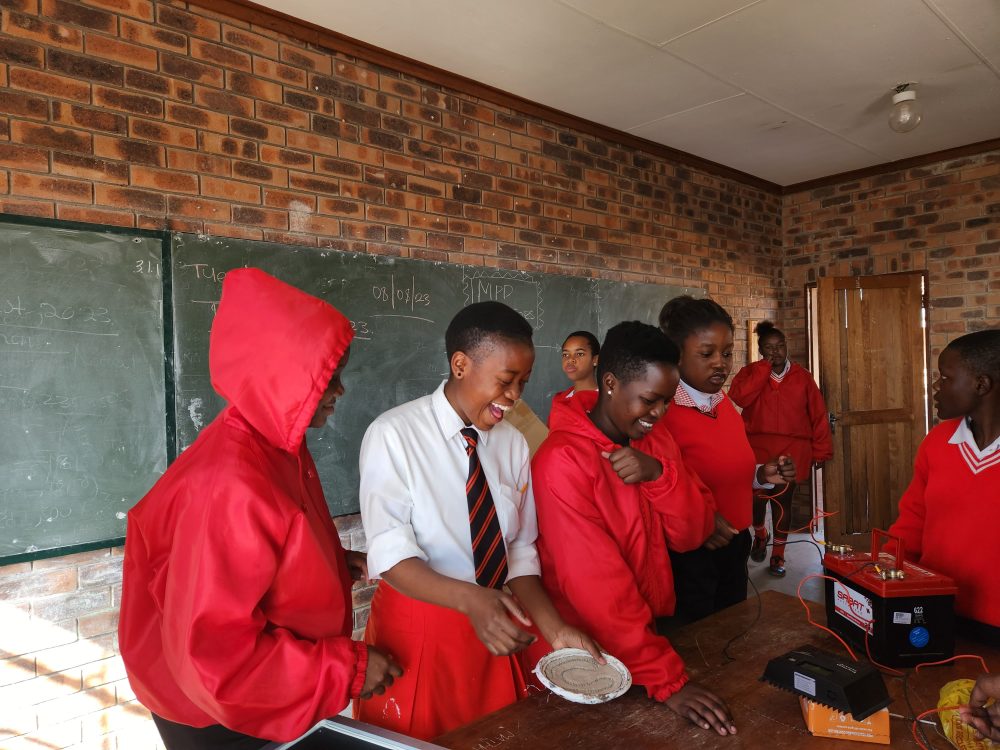Samsung’s Solve for Tomorrow enters the home stretch as finalists develop their prototypes
The ten finalist schools in Samsung’s Solve for Tomorrow competition are in a race against time to complete their solutions in the third phase of the nationwide challenge. The current phase involves creating prototypes to solve the various societal challenges the learners identified in their respective communities. This leg of the competition is running until the end of September 2023.
The learners were prepared for this phase through purposeful Design Thinking workshops held within their respective regions in May 2023. At these workshops, they were taught invaluable skills on how to best approach and get the most out of their work, think critically, speak and act like designers, and a cognitive and structured process for human-centred, creative problem-solving. They were also encouraged to focus on building strong teams and trained on how to conduct research that could help transform their ideas from mere concepts to workable solutions that would address the identified issues within their communities.
The finalist schools, who hail from the provinces of Gauteng, Mpumalanga, Free State, KwaZulu-Natal and Limpopo, now have just over a month until the end of September to work on and complete their prototypes. Following that, they will then present to a panel of judges on the 3rd of October as they vie for the top prize.
The different groups of learners are coming up with exciting and varied solutions for their communities that include an ambitious plan for better roads using sustainable materials; basic needs during load-shedding; alternative solutions for water and electricity; and clean water to name a few.
Grade 11 learner from Mbilwi Secondary School in Venda, Limpopo, Igoline Coelho, shared how her team is determined to blow the opponents out of the water. “Our team has been ready from the get-go to put in the hours and hard work needed to get us over the finish line. Ours is a very simple solution but with the potential for a high impact. The problem affects everyone and we are happy to make a contribution with our solution. We hope it can catch on and be used by many other communities. We are a very competitive team and are determined to win the competition.”


The finalist team from Acornhoek in Mpumalanga, Maphuthaditshaba Secondary School, believes they will be delivering the best solution that will help their community. “Our solution will help households and small enterprises, so it will also have an impact on the local economy. We are going to do our best to win especially because we are the only representative of our province in the competition,” said team member, Keabetswe Malaza (Grade 10).

Amahle Skhosana (Grade 11) from Adams College in Amanzimtoti, KwaZulu-Natal, said they’ve worked hard as a unit up to this point in the competition and discovered that they work well together. “Using science, technology, engineering and maths to solve our community’s problem has excited the entire team because of all the learning opportunities it presents. We are going to do our best to win to make everyone proud, but more importantly, to solve the problem.”


Sbongile Zulu, a grade 10 learner from Buhlebemfundo Secondary School in Tsakane (Gauteng) said her team feels ready to conquer after all the great insights and useful tips they learned from the Samsung mentors allocated to each school. “We are determined to do well in this competition because if we win, the prize is double – we get to solve a problem in our community and also get an awesome prize for our school. There is more than enough motivation.”
The Solve for Tomorrow competition officially launched in South Africa in January this year, and is Samsung’s contribution to youth empowerment and skills development in the information communication technology sector to help advance the country’s Fourth Industrial Revolution (4IR) agenda. It was designed to increase interest and proficiency in Science, Technology, Engineering and Maths (STEM) among grade 10 and 11 learners from underserved communities.
“As the learners enter this critical stage of the competition, we are getting excited and looking forward to seeing all the solutions they come up with. This bodes well for the future of our country as the youngsters are killing the proverbial two birds with one stone by learning and also improving or solving problems in their communities,” said Hlubi Shivanda, Director for Business Operations, Innovation and Corporate Affairs at Samsung.
The winning school will get a prize of R100 000 worth of STEM equipment for their school, while second and third positions will get R50 000 and R30 000 worth of STEM equipment for their schools respectively. In addition to the main prizes, each of the learners in the top three teams will be rewarded with a Samsung device.
Samsung proudly supports Busan’s bid for the World Expo 2030
: